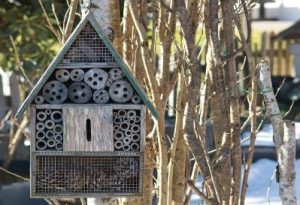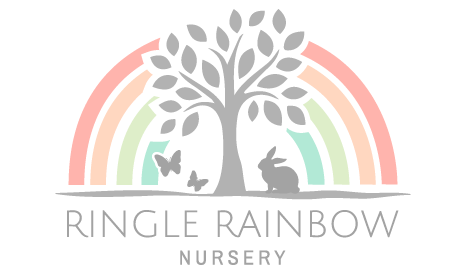Sustainability
We are setting out from the beginning to be as environmentally sustainable as possible; we know there is always more we can do but we are taking sustainable steps forwards. Some of our green initiatives are below.
Bug Accommodation
We have installed bug and other insect accommodations at our setting. In doing this we can see who comes to stay and how they live. Gaining understanding of these tiny creatures we can explain to young children that the smallest creatures want the same as things as us – to have a safe place to live, food and with the things around them that they like.
Children can explore and learn more about their natural environment and the importance of the role these bugs and insects play. As the children see the comings and goings of these flying insects and bugs, we can promote learning opportunities through first hand experiences; there’s no better way to learn.


Vegetable & Herb Garden
In our nursery planter areas in our nursery gardens the children regularly help to plant and care for flowers, herbs, and vegetables. These hands-on experiences teach them about lifecycles, caring for living things, and where food comes from.
Introduction of Plant-Based Foods – Plant Powered Fridays
Our nursery caterers Zebeedes have launched a Plant Based Fridays menu. Plant based eating besides the health benefits contributes to the conservation of land and can benefit the environment.

Learning in Nature
- Forest School Litter Picks – During our weekly forest‑school adventures children don mini‑grabbers and gloves to collect litter from woodland paths. They sort their “treasure” into recycling and waste on site and talk about how rubbish can harm animals and plants.
- Nature-Based Crafts – Children use natural and foraged materials like leaves, twigs, and pinecones to create seasonal art and play props. These activities help them connect with the changing seasons and learn to value what nature provides.
Caring for Wildlife
- DIY Bird Feeders – Using saved cardboard tubes, sunflower‑seed mix and foraged sticks, the children create feeders to hang around both our forest school base camp and nursery garden. They enjoy tracking which birds visit with tally charts and learning to care for the creatures around them.
- Building Natural Shelters – The children work together to build small shelters for insects and wildlife using logs, sticks, stones, and leaves. This encourages teamwork and fosters an understanding of habitats and ecosystems.
Celebrating the Green Calendar
Throughout the year, we take part in a range of environmental awareness events to help our children connect with global sustainability messages. On Earth Day (22 April), we create an eco-art gallery using reclaimed materials, and families contribute to our “Promise Tree” with leaves bearing their pledges for greener living. For World Bee Day (20 May), we run a fun-filled bee-dance movement session and make wildflower seed bombs to support our local pollinators. On World Environment Day (5 June), we organise a community mini-cleanup in the local park and host an upcycled planting pots workshop for children and their families.
These annual highlights reinforce our year‑round curriculum but also build excitement and community involvement.
Reduce, Reuse, Recycle
- Recycling in Practice – We have accessible recycling bins in the nursery and children are encouraged to use them daily. Through guided activities and discussion, they learn what items belong in the recycling and why it’s important.
- Story, Song & STEM – Through engaging stories, songs, and hands-on creative activities, we embed recycling and sustainability concepts into everyday learning.
Small Steps, Big Impact
We know little hands can make a big difference. By combining hands‑on experiences, special celebration days and everyday eco‑habits, we nurture a generation that respects and protects the natural world.
